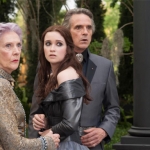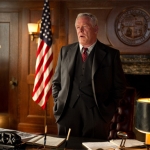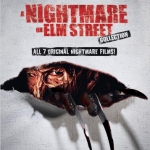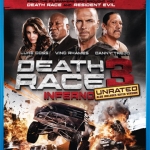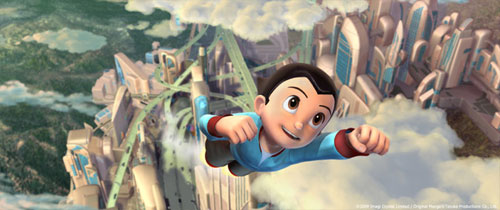
Astro Boy, the new 3D animated film from Imagi Animation Studios based on Osamu Tezuka’s Japanese franchise from 1952, contains everything that appeals to kids but also explores some darker themes that may be more suited to adults. I’m going to try to avoid too many spoilers in this review, but a few thematic points I want to mention will require some broad and general references about third act developments and a description of some surprising plot points at the beginning of the movie.
Astro Boy opens with a clever cel-shaded cartoon narrated by Charlize Theron that sets up the film’s world of the future. In a nutshell, humans have polluted the Earth beyond all hope of recovery, and the surface of the planet is a wasteland of dying animals and ruined land. Forward-thinking folks launch an unsullied mountain region into the sky, name it Metro City, and live obliviously posh lives without regard for the decimated world they’ve left below them. Robots are plentiful in Metro City, waiting on their human masters’ every demand. When robots break down, they’re just dumped overboard, further cluttering the surface of the Earth.
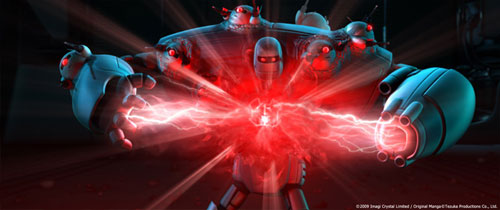
Chief among the proponents and designers of the now essential robots is Dr. Tenma, voiced by Nicolas Cage. He is working directly with the wickedly obsessed General Stone (Donald Sutherland) on a war robot called the Peacekeeper. When the Peacekeeper, tampered with by Stone, goes on a rampage and kills Tenma’s son Toby, Tenma sinks into depression and grief. Desperate for his lost son, he constructs a new robot that looks just like Toby and in fact believes it is Toby. Tenma soon realizes that he can’t replace his son and rejects the robot, casting it out into a cruel world on its own. Of course, that’s where things really get complicated since the robot (soon to be renamed Astro Boy) is powered by a rare energy core the President covets. A great military manhunt ensues while Astro Boy tries to find his way in the world and on the surface of the ruined Earth.
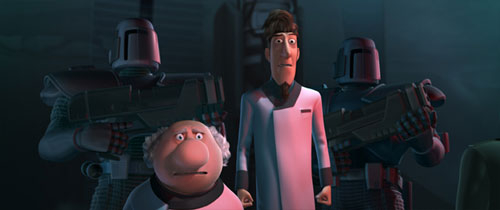
In addition to Cage and Sutherland, the rest of the voice cast is quite impressive, featuring Kristen Bell as a surface-dwelling orphan, Bill Nighy as the benevolent Dr. Elefun, Nathan Lane as the ringmaster Ham Egg, and even Samuel L. Jackson in a robotic role with perhaps three brief lines, all digitally distorted. The only weak link in the voice chain is Nicolas Cage as Dr. Tenma. From the start, it’s clear that Dr. Tenma is playing Nicolas Cage and not the other way around. Cage’s distinctly calm but borderline insane voice overpowers all of Tenma’s scenes, detracting from several scenes that otherwise would have been heartbreaking. Tenma comes across as a generally unsympathetic character, and Cage’s voice might lend to that.
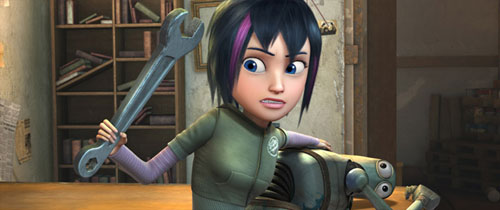
As bad as Cage is, Donald Sutherland is delightfully sarcastic and smarmy as General Stone. Stone is believably single-minded and wicked, and he’s willing to decimate his own population by starting a war just to ensure his own re-election. There are several opportunities for real world political jabs in scenes such as the Stone press conference, over which flies a banner decrying that it’s not a time for change. Through it all, Sutherland delivers his lines with just enough menace to keep him wicked and credible.
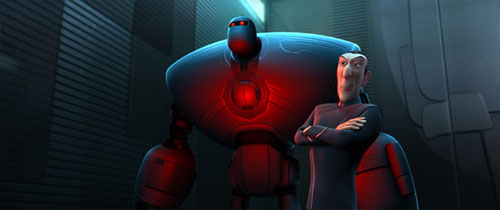
Astro Boy works on several levels. The top and obvious one is that it’s an adventure story with plenty of flying, explosions, and wacky robot antics to fill its hour-and-a-half runtime. Equally prominent is a mature story about grief, loss, and death that is so darkly profound that it’s somewhat shocking in what otherwise could be a standard kids’ film. In fact, some of the scenes and motivations likely will require parental guidance for the youngsters. I heard a kid behind me ask his dad, “Where’s his real son?” shortly after a manic Tenma begins work on the Toby replacement. I don’t envy the parent trying to field that question in the middle of a movie theater.
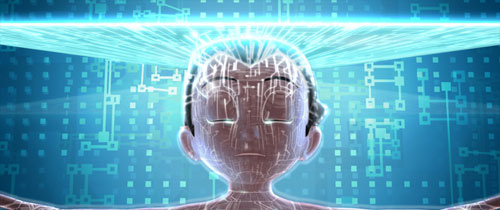
Tenma’s grief and guilt cause him to toss Astro Boy out shortly after his creation, and even the usually caring Dr. Elefun offers Astro nothing better than an assurance that he’ll find his destiny in the world. It’s a bleak situation for any kid, robot or not. Once he’s been outcast and is on the surface, Astro Boy still suffers the pangs of being unwanted and out of place, from his acceptance into a shady carnival to his accidental entry into the Robot Revolutionary Front to a series of bitter and unexpected betrayals. Everywhere he turns, Astro Boy is shunned. He’s shunned, that is, until he proves himself useful to those who have shunned him, at which time he becomes everyone’s best friend. This is supposed to be a happy point in the movie as Astro proves his worth to his detractors, but it really rubbed me the wrong way and made me see every other character in the movie as opportunistic and false.
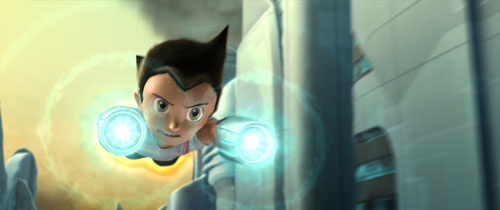
The best comparison I can make for Astro Boy is with Rankin and Bass’s classic Rudolph the Red Nosed Reindeer Claymation cartoon. Santa (here, Dr. Tenma) and all the reindeer and elves shun Rudolph (here, Astro Boy) for being different, and Rudolph eventually finds himself cast out to the Island of Misfit Toys (here, the ruined surface of Earth). While there, he befriends a group of orphaned toys (here, Ham Egg’s kids) and eventually brings danger to them in the form of the Bumble (here, Stone’s government troops). In the end, Rudolph escapes danger and saves the day with his bright nose, the very thing that made him an outcast to begin with. Without spoiling the ending of Astro Boy, you can imagine where things go. Rudolph’s triumph and the way he was cool with being loved by Santa and everyone else who previously hated him always bothered me, and that’s true with Astro Boy as well. If I were Rudolph, I’d have kicked Santa right in his big fat jolly belly.
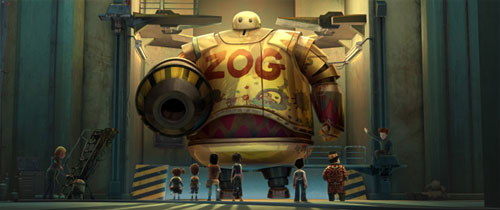
In conclusion, Astro Boy is a maturely themed action film with fantastic animation and a great retro / art deco look. Some of the moral outcomes that rubbed me the wrong way might not affect others, so I do recommend that you check this one out.
Rating: 3.5 / 5 Stars


